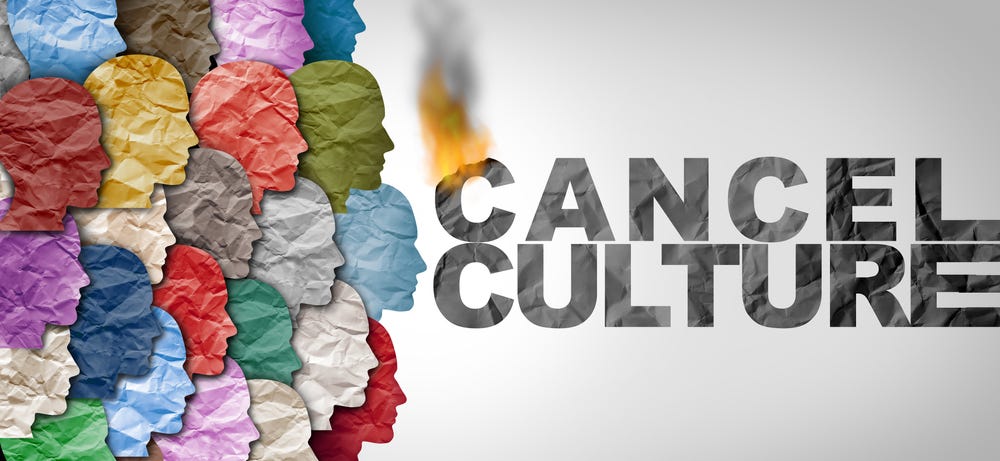E-Pluribus | March 21, 2022
Is an armistice possible in the cancel-culture war; which, by the way, is real; and the Republican threat to democracy.
A round up of the latest and best writing and musings on the rise of illiberalism in the public discourse:
Megan McArdle: We need to reach a cancel-culture truce
While we’re still far from consensus, there seems to be a growing recognition not only of the existence of cancel culture but that neither side of the political or ideological spectrum holds a monopoly. Megan McArdle writes at the Washington Post about the need for a truce; however, McArdle’s assertion that each side granting free speech to the other is the truce, it will be a hard sell to cancel culture enthusiasts.
It is easy for an intelligent adult to start with the particulars of any speech controversy, and reverse engineer some set of principles that — just coincidentally! — gives their own side the right to say whatever it wants, while granting opponents only the right to remain silent. Since the other side is equally adept, we end up mired in a circular argument that ends up in the same place it started, except with everyone even angrier.
And so I’ve come to think we should talk less about free speech as a right, and more about free speech as a truce. As with any truce, it will not be honored in the breach; if you try to silence your opponents, expect them to silence you just as energetically. No matter how exquisitely logical your argument, you will never induce them to unilaterally disarm.
At the moment, we have the opposite of a truce. The right birthed Donald Trump, who has never met a civic norm he wouldn’t trample. The left, which at this point basically has total control over the centers of cultural production, has managed to get media, academia and a lot of large corporations to adopt a narrow progressive orthodoxy. Those institutions don’t just endorse that orthodoxy, but enforce it — on employees, customers and even local governments.
Just as the right should never have expected the left to calmly pretend things were business as usual while Trump was ripping up the old social contract, the left should never have expected the right to leave them alone while they used their cultural and economic power to drive conservative viewpoints out of the public square. Conservatives were going to use whatever levers they could find — including their outsized political power — no matter how sincerely the left insists that no, that’s not fair, government power is different.
Read it all here.
Charlie Sykes: Yes, Cancel Culture Is Real
Reacting to the New York Times free speech editorial at The Bulwark, Charlie Sykes provides a good round up of stories of cancellation from both sides. While pointing out, as many others have, the Times editorial board’s unfortunate assertion of a right to not “shamed or shunned,” Sykes decries the undeniable illiberal impulse that plagues too much of the public discourse today.
Perhaps appropriately, given the ongoing clash between autocracy and democracy, another debate about the nature of liberalism has broken out. In case you missed it, the New York Times editorial board set off the latest kerfuffle over cancel culture and free speech with an editorial this weekend.
For all the tolerance and enlightenment that modern society claims, Americans are losing hold of a fundamental right as citizens of a free country: the right to speak their minds and voice their opinions in public without fear of being shamed or shunned.
As a horde of flying critics has pointed out, this both overstates and understates the problem. As a simple matter of constitutional law, there is no “fundamental right” to be free from the fear of “being shamed or shunned.” So that is an overstatement, and it has been widely dunked upon.
But the NYT also understates the problem because the threats to free speech often go far beyond merely shunning and shaming.
[ . . . ]
You don’t have to regard these attacks on free speech as either legally or morally equivalent to recognize that the attacks do, in fact, come from both sides. Recognizing the bipolar assault on speech doesn’t excuse or minimize the other side’s illiberalism; instead it underlines the fragility of the one-time consensus over the centrality of free speech in our culture.
Read it all.
Sheri Berman: The Real Threat to American Democracy
While Sheri Berman does not dispute that the current assault on democracy in America is bipartisan, the author and political science professor at Columbia University writes at Persuasion that, in recent years, the Republican party under Donald Trump presents unique and serious threats that, despite Trump’s defeat in 2020, have not gone away.
Given such disagreements, objective criteria are needed to assess what really are the greatest threats to American democracy. Such criteria must be independent of our partisan sympathies and grounded in an academic and historical understanding of how democracy decays.
Today, particularly in more developed countries, this decay often happens gradually at the hands of elected leaders who progressively undermine democratic norms and institutions. This incremental erosion has happened to several once-promising democracies, including those of Hungary, Turkey and India.
Since democracy today is more likely to suffer a death of a thousand cuts than to be killed all at once, one way to assess which party poses the greatest threat is quantitative: the more anti-democratic infractions, the more serious the threat. But while numerous infractions are necessary for democratic decay, democracy is unlikely to be undone by disconnected or intermittent measures. Instead, the real danger comes from strategic and systemic actions explicitly designed to cumulatively weaken democratic norms and institutions.
With this insight, it becomes clear that, while Democrats have broken the democratic rules of the game, it is the Republican Party that poses the real danger to American Democracy.
[ . . . ]
Since then, the Republican Party has continued to peddle lies about the security and fairness of our electoral system. These lies were used to justify sham audits of election results, frivolous lawsuits, and attacks on election officials. Now, a majority of Republican voters not only view Biden’s victory as illegitimate, but also believe that our electoral system is pervaded by fraud. As Lee Miringoff, Director of the Marist College Institute for Public Opinion, notes, “when looking ahead to the 2024 Presidential election, it is remarkable that a bedrock principle of democracy—that losing candidates and their supporters accept the results—is not held by nearly two in three Republicans who say they will question the results if their candidate does not win.” And perhaps not merely “question” those results, since Republicans who falsely believe Democrats cheated during the 2020 election are more likely to say that violence is a legitimate tool for addressing future “stolen” elections.
Read the whole thing.
Around Twitter
The fallout continues from the New York Times editorial board’s free speech editorial last week. Here’s Ben Dreyfuss on cancel culture:
In the wake of incredulity about her experiences as an opponent of school pandemic closures and lockdowns, author and essayist Ann Bauer invites other to share their stories of ostracism and haranguing for express their views:
Via Jesse Singal with the latest victim of the transgender rights mob, an author up for an award from an LGBTQ writers’ group:
Finally, Twitter has done it again:











